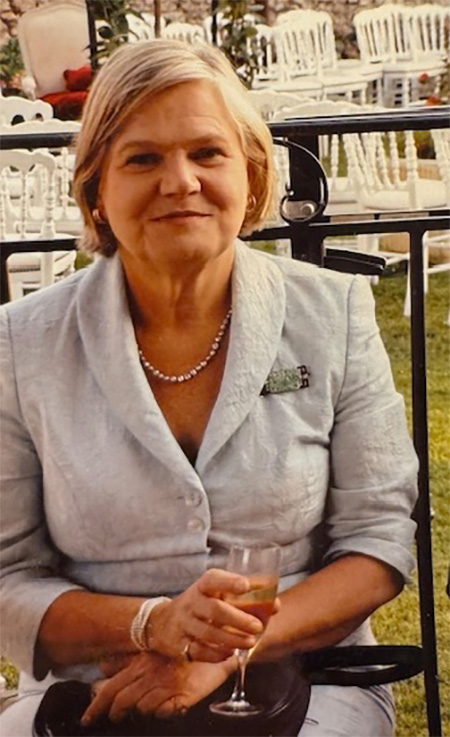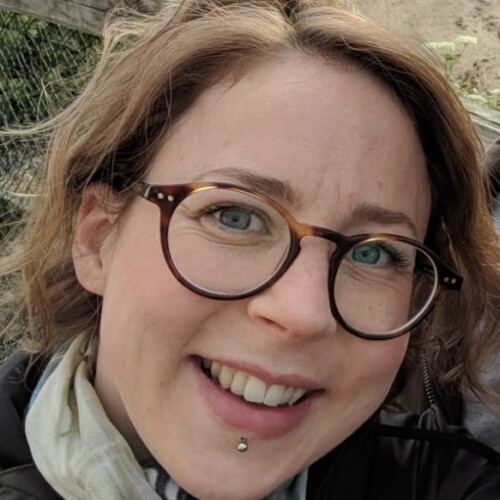By JENNY BRYAN

Joanna Lyall
In the mid 1980s, when Joanna Lyall suggested writing a book about cancer for people living with the disease, patient-focused information was scarce. As a result, Penguin Books quickly recognised the potential for a book that combined medical information and practical advice, with the aim of enabling patients to make informed decisions about their care. While I put together the chapters of Living with Cancer that described the different types of cancer and treatment options, Joanna dug deep into the functional, emotional, social and financial challenges and told the human story of cancer through the experiences of patients from all walks of life.
Throughout her long career as a journalist, Joanna’s great skill was getting to the heart of every story she told – not just asking the right questions but truly listening to and remembering what people told her. When she arrived at General Practitioner in 1977 with local newspaper experience on the Kensington Post and Western Daily Press, she had all the journalistic instincts for finding stories to interest her new primary care audience and the ability to write them in a way that needed little editing. Her preference was for feature writing, and her profiles of leading medical figures of the time were second to none.
When freelance offers began to accumulate, Joanna became the first of the 1977 intake of journalists recruited by GP Editor, Jerry Cowhig, to embrace the freelance life – writing on health and social issues, food, dance and travel including for the Sunday Times, Daily Telegraph, Guardian, Observer, and Radio Times. In the mid-90s, she was tempted back into medical publishing – joining the Health Service Journal as Features Editor where she was highly regarded for her professionalism, generosity and sense of fun. In recent years, her undiminished interest in other people’s lives took her into obituary writing, mainly for the Guardian and the BMJ, where she once again excelled at providing fascinating insights into both the professional and personal lives of her subjects without being intrusive.
Joanna’s interests stretched far beyond journalism. For 10 years, she was Honorary Secretary of the Pugin Society – an organisation devoted to raising awareness about the significance and lasting influence of Pugin in nineteenth-century architecture and design. In her travels, she visited countless towns and cities, mainly in Europe, and immersed herself in their history and culture. With strong family ties to France and fluent French, Paris was always her favourite city, and she spent a year there as a journalist through a Journalistes en Europe scholarship. An avid reader and cinema-goer, it comes as no surprise that she liked biographies and biopics, though her knowledge and love of Graham Greene novels took her to the annual Graham Greene International Festival over many years.
To her family and many friends, Joanna was not only kind, supportive, loyal and always interested, she was a brilliant conversationalist – bringing together carefully matched groups of people at legendary lunches that always continued long into the evening. Isabel Walker, another long-time friend from GP days, suggests that, if Joanna had lived in the 18th or 19th century she would have held regular ‘salons’, gathering interesting people around her. Who knows what important discoveries and thought-provoking ideas would have emerged?!
Former colleagues share their memories
Telegraph Health Editor Laura Donnelly, who worked with Joanna at the Health Service Journal, said “Joanna was a true doyenne who could say everything with one raised eyebrow. Generous, entertaining, she was interested in people, faith, and had a wonderfully spiky sense of humour.”
From another colleague at the HSJ, Louise Thomas:
“Joanna became features editor at Health Service Journal while I was picture editor. She worked in a calm and methodical way without attracting much attention to herself, as she was always interested in other people’s stories – a quality that later led her to enjoy writing obituaries. She would often produce features for HSJ on the social and personal history of health – a gift to a picture editor – because the provision of healthcare was never just top line policy to her; it always had personal implications.
I realised how kind she was when she appeared in the office one day carrying a heavy bag in each hand. Joanna had bought potted hydrangeas for Lucy Holloway, our then art editor, and me, in thanks for the work we’d done on a big supplement she had edited (possibly the 50th anniversary of the NHS in 1998).
I was to come to experience this generosity many times over when we later became personal friends. Kindly – always handwritten – messages would drop through the letterbox, sometimes accompanied by thoughtful gifts that would often be the outcome of something we’d been discussing (such as the clothes moth traps I’m still using!).
Joanna had a great capacity for friendship and was very good company, always ready to listen and contribute thoughtful insights, to enjoy running jokes, devise interesting outings and generally share her joie de vivre. She was devoted to her nieces and their children, and a kind and loyal friend to many, including me, and I will miss her.”



Recent Comments